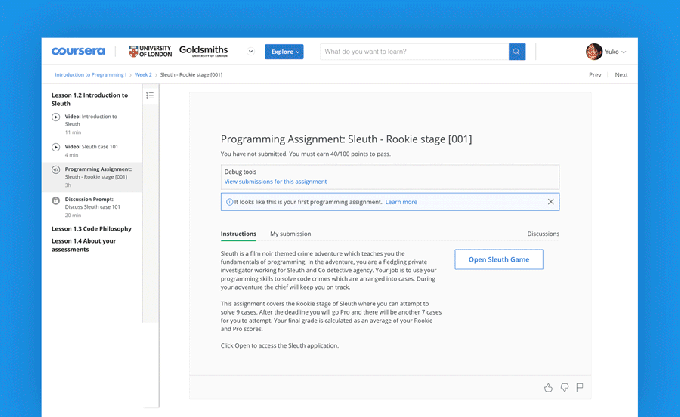Coursera, the online education platform now valued at over $1 billion, has made its name through its popular e-learning programs, working with some 190 universities and big names like Google to bring some 3,600 courses and 14 degrees online, attracting 43 million learners to date. Now, it’s taking a significant step in its development.
First, Coursera has made its first-ever acquisition, of a startup called Rhyme Softworks, which has built a platform that lets developers build hands-on, virtual e-learning projects that can be executed from a user’s internet browser. And along with that, Coursera is launching a new offering called Coursera Labs, which will let educational institutions and industry partners (and eventually enterprises) build their own hands-on learning projects, powered in part by the Rhyme technology.
The deal and the Labs product have been in the works for a while before today, and so some partners have already started to build projects around the offering, like this project from the University of London called Sleuth, to help teach programming skills:

The terms of the deal to acquire Rhyme are not being disclosed — and it’s not clear who its investors were, as Crunchbase lists only a pre-seed round for the startup. But Jeff Maggioncalda, the CEO of Coursera, said that it includes not just Rhyme’s IP and related assets, but its team of six, who will now form the basis of a new R&D office for the company out of Sofia, Bulgaria led by Rhyme’s co-founder and CEO, Namit Yadav. Coursera will also be investing millions in the company’s technology as part of its Coursera Labs initiative.
The idea behind developing Coursera Labs is to bring more flexibility as well as customization into the Coursera platform. Aimed at courses that have strong project and development components to them such as programming, math, or perhaps marketing projects — but not, for example, necessarily a course on 20th century history or Japanese literature — the idea is to bring in more of the tools that have become standard in those disciplines as they are taught elsewhere, and as they are used elsewhere (such as in job applications). Tools that are supported to Labs projects include Jupyter Notebook, RStudio, VS Code, cloud software consoles, and native desktop applications, the company said. Educators building courses can use templates from these or create custom courses for their needs.
The new initiative to offer Labs signals an interesting shift for Coursera in another regard: it will be the first time that the company will have a significant amount of content that will require a person to be “online” in order to use it, a change from previously, when leaners could take work offline to do it. Maggioncalda said however that bandwidth is not an issue — very little of it is required — which will be key considering the growth that Coursera has seen in many emerging markets outside of its home base of the US.
What the change could mean is interesting: Coursera will be able to offer more analytics now to course creators (and to learners) about how long projects take to complete, what questions give people more pause, and more. It will also give those building online courses a new window into making content specifically for the Coursera platform, rather than work that was originally built for consumption in the class being translated into the Coursera (or indeed more generally e-learning) environment. Important to note, though, that Coursera Labs will be one part of a wider toolkit: there will still be a lot of Coursera courses that do not use it, and do not really need to.
Maggioncalda hinted that there will be another chapter coming in how Labs and Coursera will be developing later in the year that could see the initiative scaling up even more. That could in part be down to extending Labs to Coursera Enterprise users, which is a newer area for the company that provides training for knowledge workers and now has 2,000 customers, Maggioncalda said.
from TechCrunch https://ift.tt/2LcQOGi
via IFTTT
Comments
Post a Comment